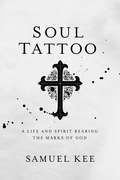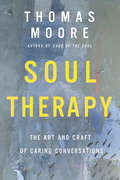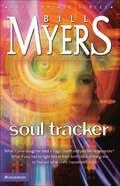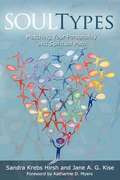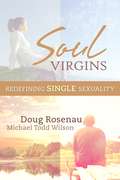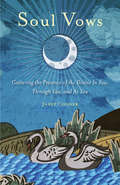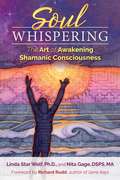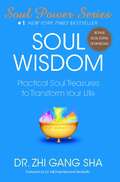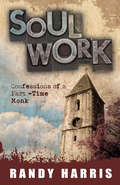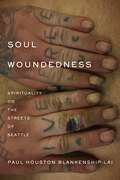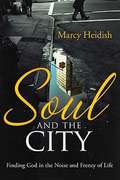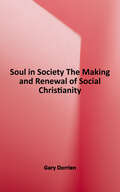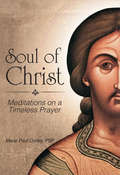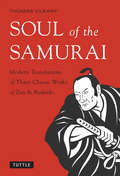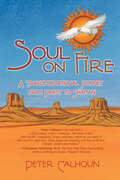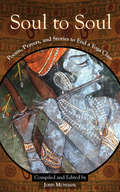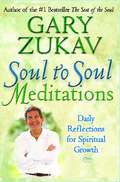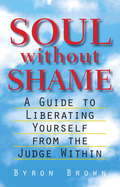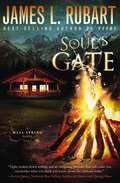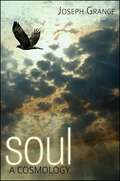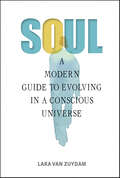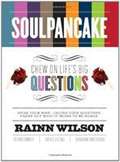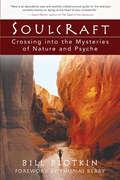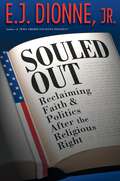- Table View
- List View
Soul Tattoo: A Life and Spirit Bearing the Marks of God
by Samuel KeeYou may not have a single tattoo on your body--or you may have run out of space for new ones. Either way, God offers something far more permanent than ink on skin. In Isaiah 43, God declares eternal promises of His love ... four tattoos for your soul: You Are Mine I Will Be With You I Love You I Created You for My GloryEngraved by the hand of the Master, these soul tattoos will never fade.
Soul Therapy: The Art and Craft of Caring Conversations
by Thomas MooreThe New York Times bestselling author of the classic The Care of the Soul addresses the needs of those providing soul care to others—therapists, psychiatrists, ministers, spiritual directors, teachers, and even friends—sharing his insights for incorporating a spiritual or soulful dimension into their work and practices.Soul Therapy is the culmination of Thomas Moore’s work. In his previous acclaimed books, he explored the soul in important areas of our lives—work, sex, marriage, family, religion, and aging. In this wise guide, he now returns to his core vocation: teaching practitioners—therapists, psychiatrists, ministers, spiritual directors, and others—how to offer soul care to those they assist.A training manual infused with a lifetime’s worth of wisdom, Soul Therapy is divided into five sections: What therapy or “soul care” is and how it works;What soul work is required of the helper to be able to address the needs of others;How to access and move forward the spiritual dimension;How to apply this work to specific areas, such as work, marriage, parenting, or teaching;How to deal with other issues that arise, such as developing a therapeutic style, dealing with one’s shadow, and the need for self-care. Profound yet practical, enlightened yet grounded in real-world experience, Soul Therapy will become a definitive resource for caregivers and practitioners for years to come.
Soul Tracker (The Soul Tracker Series #1)
by Bill MyersWhat if you could visit heaven and hell, traveling when and wherever you wish . . . without ever dying? What if your teenage daughter, the joy of your life, had died a tragic death and you discovered a way to visit her? What if there were people and beings, on both sides of the grave, who want to stop your return? These are the questions facing novelist David Kauffman. As a single parent he is devastated when his young daughter meets an untimely death. Desperate to contact her, he meets Gita Patekar, a beautiful and committed Christian with a scarred and shame-ridden past. She works for &“Life After Life&”—an organization dedicated to tracking and recording the experiences of the soul once it leaves the body. Despite Gita&’s warnings that God is opposed to contacting the dead, David uses the organization&’s computer to try to find his daughter. In the process they discover Gita&’s organization has some very deep and dark secrets. A suspense-filled game of cat and mouse begins—both on earth and beyond the grave—as the couple work together, fall in love, and struggle to expose the truth . . . until they come face to face with the ultimate Love and Truth.
Soul Types: Matching Your Personality and Spiritual Path
by Sandra Krebs Hirsh Jane A. G. KiseExploration of spiritual paths typical of each of the Myers-Briggs personality types.
Soul Virgins: Redefining Single Sexuality
by Doug Rosenau Michael Todd WilsonPioneering Christian sex therapists Doug Rosenau and Michael Todd Wilson team up in this helpful and hopeful book about understanding sexuality and intimacy beyond what our "do it if it feels good" culture says it is. Providing a much-needed spiritual perspective to the sexuality debate, the authors tackle difficult topics from a biblical foundation to help single adults establish practical models for maintaining purity and creating a healthy sexuality. With real-life personal stories, Soul Virgins helps singles accept their sexuality as a godly discipline. Rosenau and Wilson provide a 3-D discussion of body, soul, and spirit that proves sexuality is ultimately more about relational intimacy than just the physical act of sex.
Soul Vows: Gathering the Presence of the Divine In You, Through You, and As You
by Janet ConnerBe True to Your Inner SelfDiscover yourself. If you long to know your soul's purpose, Soul Vows is an ideal place to begin. Your soul vows describe how you choose to walk this earth, in every moment of every day. They are how you receive and spread grace. As you live your soul vows, you become a fertile container in which your purpose can take root and prosper.Know who you are. With her characteristic blend of personal story, love of paradox, expansive inquiry into the heart of diverse spiritual wisdom and traditions, and confidence in the power of deep soul writing to elicit personal divine love and guidance, Janet Conner, spiritual speaker and author of Writing Down Your Soul, leads us through a groundbreaking application of the ancient chakra system to discover our own unique soul vows.Find soul rest and contentment. Your soul vows are your personal path to living as your full, spiritual self with authenticity, integrity, wholeness, and the vibrant presence of the Divine spirit. Your soul vows are custom-designed to help you to know yourself and live yourself; no two paths look the same.Spoken truly from soul to soul—from Janet's soul to your own. Soul vows are a living construct of a whole and holy divine in you. In this book, Janet will take you on a journey to:Honor your longing to be OneGather yourself into wholenessDeclare and celebrate your soul vowsAnd so much moreIf you were enlightened by spiritual books like Change Me Prayers, Everything Is Here to Help You, or What's in the Way Is the Way, you'll find your true self with Soul Vows.
Soul Whispering: The Art of Awakening Shamanic Consciousness
by Richard Rudd Linda Star Wolf Nita GageRestore your relationship with your soul, break through patterns of dysfunction, and learn to hear the intuitive wisdom of your soul’s whisperings• Explores shamanic tools, modern psychotherapy techniques, and ancient indigenous practices, such as the Native American medicine wheel• Explains how to differentiate between your Inner Critic and the whisperings of your soul• Details the Five Cycles of Change that we spiral through on our life’s journey of transformation, detailing what to do if you become stuck in one of the cycles• Includes access to 5 audio journeys Addressing humanity’s paradigm shift from linear consciousness to shamanic consciousness, Linda Star Wolf and Nita Gage explore how the art of soul whispering can help each of us understand why we experience our lives the way we do and shift from healing our wounds to embracing the process of transformation. This powerful new synthesis of shamanic healing and psychotherapy can help you restore your relationship with your soul, transform dysfunctional ways of being, learn to hear the intuitive wisdom and love of your soul’s whisperings, and develop the capacity to live in the present moment fully connected and alive.Detailing the shamanic tools and psychospiritual practices of soul whispering, the authors share inspiring stories of transformation from their own journeys and their work as shamanic soul whisperers. They explain how soul whispering harnesses the power of the imaginal world to awaken shamanic consciousness, restore resiliency of mind, body, and spirit, and enact transformation at the cellular level. They show how soul whispering allows you to become conscious of your wounds, release the energy of victimization, and develop love and forgiveness for yourself and others. The authors explore mythological archetypes from Sumer and ancient Egypt to empower you in your life’s journey of transformation and explain the Five Cycles of Change that we continually spiral through, detailing what to do if you become stuck in one of the cycles.Sharing the ageless wisdom of their collective shamanic experiences and personal journeywork, the authors show how soul whispering allows you to break free from your patterns of dysfunction, rekindle a profound soul connection, and shift your story from one of wounding and suffering to one of initiation and vibrancy.
Soul Wisdom: Practical Soul Treasures to Transform Your Life
by Zhi Gang ShaIn Soul Wisdom, internationally acclaimed Soul Master, healer, and bestselling author Dr. Zhi Gang Sha takes healing and personal transformation to the ultimate level, the soul level. Dr. Sha's teachings empower you to melt all of your life blockages with practical soul treasures: Soul Language, Soul Song, Soul Movement, Soul Tapping, and Soul Dance. This is the first time in history that the Divine has released these soul secrets to transform the consciousness of humanity and create love, peace, and harmony for humanity, Mother Earth, and the Universe.
Soul Work: Confessions of a Part Time Monk
by Randy HarrisSharing experiences and insights from his visits to monasteries over the years, popular speaker and university professor Randy Harris invites us into a richer, fuller life in the Spirit.Today there is a new hunger in the Christian community to live out radical and authentic faith in Christ. The days of easy answers and sound-bite Christianity are fading.Where do you go to find such faith being lived out? Randy Harris--popular college teacher and well-known preacher--turned to monasteries and hermits in his search for answers."When I decided I wanted to learn how to pray," he explains, "I sought those who had spent their lives praying. When I wanted to learn to 'be still and know that he is God,' I sought those for whom silence is a way of life. As I sought stability and balance, I found a way of life that has endured for 1500 years. I didn't exactly want to become a monk or hermit, but I did want to learn what they know--and it has become a life-changing journey."Most of us don't have time to visit a monastery or a hermit's retreat for a week or a month. So Randy Harris shows how the monastery can come to us. With wisdom, gentle humor, and captivating insight, Harris guides us on an unforgettable spiritual journey into a hidden world that very few will ever experience. You will learn prayer, humility, surrender, and quietness along this well-traveled path. And you may find yourself becoming a radical Jesus follower.
Soul Woundedness: Spirituality on the Streets of Seattle
by Paul Houston Blankenship-LaiA profound exploration into the spiritual beliefs and practices of Seattle’s unhoused youthSoul Woundedness is an intimate, piercing book about everyday life for young adults living on the streets of Seattle. Based on over five years of research and as a participant-observer, Paul Houston Blankenship-Lai presents the personal experiences of “street kids,” highlighting how their spiritual beliefs and practices offer them comfort, a sense of community, and a feeling of belonging amidst their struggles. They also demonstrate how spirituality on the streets can alienate people from themselves and the world.The stories Blankenship-Lai tells here are about how social wounds go soul deep, and how seemingly antireligious spiritual practices, fashioned in an almost unlivable local world, help people create a life still worth living. By paying deep, sustained attention to what spirituality is like on the streets and what difference it makes, Blankenship-Lai uncovers an important, overlooked dimension in the experience and study of homelessness. They invite us to enter these stories and to question how our own spiritual and otherwise practices can help create “a more loving love.”Aimed at a diverse audience, Soul Woundedness is a book not merely to educate but to transform. It is particularly relevant for those interested in spirituality’s role in addressing social inequities and underscores the importance of spiritual practices in overcoming adversity and promoting social change, making a compelling case for a world where everyone has a place to call home.
Soul and the City: Finding God in the Noise and Frenzy of Life
by Marcy HeidishYour City Guide to God Beneath the relentless rhythms of city life beats the heart of God, and award-winning author Marcy Heidish takes you into a more intimate relationship with him in the midst of crowds, chaos, and concrete. Her experiences from a curb in Brooklyn, the bay in San Francisco, a rooftop of Chartres Cathedaral in Paris, and the busy halls of Washington, D. C. , help you see the city in a new light. She turns common city distractions, annoyances, and challenges into spiritual invitations or “gateways” to a new kind of contemplation where: •screaming sirens become cues to silent intercession, •skyscrapers, like spires, pull your eyes and thoughts heavenward, •and red traffic lights work as “pause” buttons that call for you to stop and pray. “In the city there is grit,” Marcy writes. And grime and garbage. But her practical tools in every chapter for reflection, discussion, and application help you see–whether you’re visiting, working, or dwelling in Philadelphia or Phoenix, New York or Los Angeles, Seattle or Syracuse–that in the city there is also grace.
Soul in Society: The Making and Renewal of Social Christianity
by Gary DorrienGary Dorrien's major work addresses the roots of and remedy to the current crisis in American Christian social ethics. Focusing on the story of American liberal Protestantism, the book examines in fascinating depth the three major movements in this century - the Social Gospel, Christian Realism, and Liberation Theology - in a way that also brings African-American, feminist, environmentalist, Catholic, and other voices into the increasingly multicultural quest. Dorrien then carefully assesses the crisis of social Christian thought in a culture that is increasingly secular, materialistic, and dominated by capitalism. He shows how the progressive Christian vision of social and economic democracy can be redeemed in the face of its apparent defeat. He argues strongly for a social Christianity faithful to the spiritual reality and kingdom-oriented ethic of the way of Christ. Dorrien's engaging narrative, knowledgeable and fair analysis, and thoughtful proposal bring desperately needed clarity and commitment to the Christian social conscience.
Soul of Christ
by Marie Paul Curley FSPThe Anima Christi, or Soul of Christ, has been prayed by Christians since the fourteenth century. Sister Marie Paul Curley, FSP, delves into its richness as she reflects on the prayer, the Eucharistic imagery within, and its application for every Catholic. Each chapter contains a section that could be used as a guided holy hour for an individual or a group, or just read as further reflection. With practical applications, thoughtful meditations, and centuries' worth of tradition, Soul of Christ: Meditations on a Timeless Prayer is designed to bring you closer to Christ.
Soul of the Samurai
by Thomas ClearyIn Soul of the Samurai respected author and translator Thomas Cleary reveals the true essence of Bushido or Zen warrior teachings according to 17th-century Japanese sword master Yagyu Munenori and his Zen teacher Takuan Soho.This book contains the first English translations of their seminal writings on Bushido. Cleary not only provides clear and readable translations but comprehensive notes introducing the social, political, and organizational principles that defined Samurai culture-their loyalty to family, their sense of service and duty, and their political strategies for dealing with allies and enemies.These writings introduce the reader to the authentic world of Zen culture and the secrets behind the Samurai's success-being "in the moment" and freeing the mind from all distractions, allowing you to react instantaneously and instinctively without thinking. In these classic works we learn that Zen mental control and meditational training were as important to the Samurai as swordsmanship and fighting skills.The three works of Zen Bushido translated in Soul of the Samurai are:The Book of the Sword by Yagyu Munenori, The Inscrutable Subtlety of Immovable Wisdom by Takuan Soho, and The Peerless Sword by Takuan Soho.
Soul on Fire: A Transformational Journey From Priest To Shaman
by Peter CalhounSoul on Fire is a magical collection of stories describing the awakening of spiritual powers of an Episcopal priest turned shaman—powers that have usually been ascribed to Eastern masters of traditional shamans. It is about the quest for "lost knowledge" and the powers that Christ himself once promised.Within these pages we learn about the "Path of Return" to our wondrous Earth as a means by which we can reclaim our original soul powers. Soul on Fire is an inspirational guide and must-read for long-time seekers and those just beginning their journey alike. It may just be in a genre of its own. At a time when old modalities no longer seem to be working for many people, the stories in this book reveal a different way of thinking, feeling, and being. You won’t be able to read this book and still perceive the world in the same way.
Soul to Soul
by John MundahlYoga continues to be a growth industry with an estimated thirty million people in North America now practicing either privately or in most cases with a class. Though the yoga market is fractured by the great number of competing schools and philosophies, what they all have in common is the ending of the session with a period of relaxation coupled with inspiring readings.Soul to Soul fills just this need with a beautiful collection of 150 inspiring perfect-length readings plus tens of quotes that are just right for ending a yoga class or private session. Honoring many spiritual traditions, it's the perfect teaching tool or gift for yoga teachers and practitioners, or for anyone seeking uplifting messages for any occasion. Includes writing by Swami Kripalu, Thich Nhat Hanh, Deepak Chopra, Eckart Tolle, H.H the Dalai Lama, Don Miguel Ruiz, quotes from Rumi, Hafiz, Gandhi, Meister Eckart, Lao Tzu, as well as selections from the Bhagavad Gita, and the Yoga Sutras of Pantajali. Unlike most books intended for yoga teachers, Soul to Soul has strong appeal to teachers in nearly any tradition, and to a wider range of their students.John Mundahl has been a yoga teacher and practitioner for over thirty-six years. He was a resident at the original Kripalu Yoga Ashram in Sumneytown, Pennsylvania, from 1977-1981, the four years of Swami Kripalu's remarkable stay. He is the author of twelve books, including From the Heart of the Lotus, the Teaching Stories of Swami Kripalu. He lives in St. Peter, Minnesota.
Soul to Soul Meditations: Daily Reflections for Spiritual Growth
by Gary ZukavInSoul to Soul, Gary Zukav addressed some of the most fundamental questions about the human spirit -- from "Why is life so difficult?" to "How can I learn to trust?" -- with meaningful answers of universal and enduring value. Now, withSoul to Soul Meditations, Zukav provides 365 inspirational excerpts, one for each day of the year, with each page offering penetrating spiritual and psychological insights for reflection and enrichment. These meditations serve as passageways through which soul-to-soul communications can enter your life and transform it. Wise, often poetic, and profound in its simplicity, this empowering collection invites us to look within ourselves to discover how to make these insights our own. Small enough to fit into a bag or purse, it is a book to take with you and read whenever you wish. It makes an ideal gift for a friend, someone you love, or simply for yourself -- a book to cherish and return to again and again. Among his many bestselling books,GARY ZUKAVis best known for his celebrated #1New York Timesbestseller,The Seat of the Soul, as well as forThe Dancing Wu Li Masters: An Overview of the New Physics, which won The American Book Award for Science. His books have sold well over 5 million copies and have been published in 24 languages. A graduate of Harvard University and a former U. S. Army Special Forces (Green Beret) officer in Vietnam, he lives in southern Oregon with his spiritual partner, Linda Francis.
Soul without Shame
by Byron BrownWhether we call it the inner critic, superego, or just plain nag, most of us have a "judge within" who's constantly on our case. A comprehensive guide to understanding how the inner critic works, this book offers practical, positive suggestions for breaking free of it. Using straightforward language and examples from everyday life, Byron Brown shows:Where the inner judge came fromHow it operatesWhy it trips us upWhy we believe we need itHow to develop awareness of itHow to disengage from itThe "soul qualities" we can develop to weaken its influenceEach chapter begins with an episode of the "Frank and Sue story," dramatically illustrating how the inner critic works; each chapter ends with a simple exercise designed to help the reader move along the path of self-discovery.
Soul's Gate (A Well Spring Novel #1)
by James L. Rubart"Every now and then we get a break from reality. A glimpse into the other world that is more real than the reality we live in 99 percent of our days. The Bible is about a world of demons and angels and great evil and even greater glory."What if you could travel inside another person's soul? To battle for them. To be part of Jesus healing their deepest wounds. To help set them free to step boldly into their divinely designed future.Thirty years ago that's exactly what Reece Roth did. Until tragedy shattered his life and ripped away his future.Now God has drawn Reece out of the shadows to fulfill a prophecy spoken over him three decades ago. A prophecy about four warriors with the potential to change the world . . . if Reece will face his deepest regret and teach them what he has learned.They gather at a secluded and mysterious ranch deep in the mountains of Colorado, where they will learn to see the spiritual world around them with stunning clarity--and how to step into the supernatural.Their training is only the beginning. The four have a destiny to pursue a freedom even Reece doesn't fully fathom. But they have an enemy hell-bent on destroying them and he'll stop at nothing to keep them from their quest for true freedom and the coming battle of souls."Readers with high blood pressure or heart conditions be warned: this is a seriously heart-thumping and satisfying read that goes to the edge, jumps off, and 'builds wings on the way down.'" --Publishers Weekly
Soul: A Cosmology
by Joseph GrangeContemporary culture is soulless. A dead concept to contemporary thinkers, "Soul" has been displaced by philosophical and scientific abstracts. Yet, argues Joseph Grange in this timely and thought-provoking book, without Soul we are left defenseless against the negative constructs of our culture; neither matter nor mind, nor brain, nor consciousness has the power to restore the quickness of our existence. Indeed, without Soul, ethics, particularly honesty, easily turns into its opposites: spin, sophistry, artful deception.Providing a speculative, systematic cosmology based on the methodology developed by Alfred North Whitehead and referencing a variety of philosophers, Western and Eastern, classic and contemporary, Grange offers an understanding of Soul as expression. Grange lays out the basic characteristics of Soul as transformative, social, and conscious power and goes on to discuss the possibility of mystical reason and experience. Actual steps to reconstruct Soul, including meditation, are offered. Spinoza's Ethics, Vipassana meditation, and Cognitive Behavioral Therapy are shown to have particular resources for soul transformation.This volume concludes Grange's trilogy of cosmologies. Nature: An Environmental Cosmology and The City: An Urban Cosmology discussed the natural environment and the cultural environment. The Soul complements these with an account of the spiritual environment.
Soul: A Modern Guide to Evolving in a Conscious Universe
by Lara van ZuydamThe primeval intelligence of the human soul and the ecosystem within which it operates have long remained secret, their deeper mysteries overlooked, obfuscated, or simply misunderstood. In Soul: A Modern Guide to Evolving in a Conscious Universe, Lara van Zuydam clarifies and democratizes key esoteric information by unpacking the concept of the human soul at a granular level and explaining how it interacts with the other spiritual layers that make up a human being. • The book comprehensively and concretely introduces the soul, from describing what it is to why it is currently housed in a human body, and explains the purpose of incarnation in a challenging world • It explains the distinction between the soul and the notion of "spirit," our connection to antiquity, and our deeper connection to the Source • It discusses how the modern fixation on angels and other benevolent beings has cultivated a skewed perception, and that penetrating the mysteries without invoking the necessary protections isn&’t always safe • The author draws on her own experiences, the philosophical landscape articulated by the ancients, and also explores some of the more abstruse concepts discussed by influential mystic Alice A. Bailey This powerful work explores, simplifies, and clarifies the fascinating concept of the soul and why it is important to develop self-awareness. Touching on deep topics such as death, reincarnation, and the nature of evil, it reaches beyond the light to explain how we can optimize our humanity on the journey toward self-actualization.
SoulPancake: Chew on Life's Big Questions
by Rainn Wilson Devon Gundry Golriz Lucina Shabnam MogharabiBased on the wildly successful website SoulPancake.com, this book urges you to explore philosophy, creativity, spirituality, love, truth, science, and so much more. With bold questions, intriguing challenges, and mind-bending art, SoulPancake creates a space for you to stimulate your brain stem, spark your soul, and figure out what it means to be human.
Soulcraft: Crossing into the Mysteries of Nature and Psyche
by Bill PlotkinSince 1980, depth psychologist Bill Plotkin has been guiding women and men into the wilderness — the redrock canyons and snow-crested mountains of the American West — but also into the wilds of the soul. He calls this work soulcraft. There’s a great longing in all people to uncover the secrets and mysteries of our individual lives, to find the unique gift we were born to bring to our communities, and to experience our full membership in the more-than-human world. This journey to soul is a descent into layers of the self much deeper than personality, a journey meant for each one of us, not just for the heroes and heroines of mythology. A modern handbook for the journey, Soulcraft is not an imitation of indigenous ways, but a contemporary nature-based approach born from wilderness experience, the traditions of Western culture, and the cross-cultural heritage of all humanity. Filled with stories, poems, and guidelines, Soulcraft introduces over 40 practices that facilitate the descent to soul, including dreamwork, wilderness vision fasts, talking across the species boundaries, council, self-designed ceremony, nature-based shadow work, and the arts of romance, being lost, and storytelling.
Souled Out: Reclaiming Faith and Politics after the Religious Right
by E. J. DionneThe religious and political winds are changing. Tens of millions of religious Americans are reclaiming faith from those who would abuse it for narrow, partisan, and ideological purposes. And more and more secular Americans are discovering common ground with believers on the great issues of social justice, peace, and the environment. In Souled Out, award-winning journalist and commentator E. J. Dionne explains why the era of the Religious Right--and the crude exploitation of faith for political advantage--is over. Based on years of research and writing, Souled Out shows that the end of the Religious Right doesn't signal the decline of evangelical Christianity but rather its disentanglement from a political machine that sold it out to a narrow electoral agenda of such causes as opposition to gay marriage and abortion. With insightful portraits of leading contemporary religious figures from Rick Warren and Richard Cizik to John Paul II and Benedict XVI, Dionne shows that our great religions have always preached a broad message of hope for more just human arrangements and refused to be mere props for the powers that be. Dionne also argues that the new atheist writers should be seen as a gift to believers, a demand that they live up to their proclaimed values and embrace scientific and philosophical inquiry in a spirit of "intellectual solidarity." Written in the tradition of Reinhold and H. Richard Niebuhr, Souled Out will help change how we think and talk about religion and politics in the post-Bush era.
Soulful Living: The Process of Personal Transformation
by Rick Nurriestearns Mary NurriestearnsThere are two main ways we become wiser, said Joseph Campbell, the great mythologist-- through revelation and through suffering. For must of us, suffering is by far the most common process. Because suffering is a part of everyday life, this means that opportunities for cultivating wisdom, personal growth, and transformation are limitless. In fact, if we totally eliminated suffering in our quest for happiness, we would stunt our spiritual growth, because this would mean eradicating our major path to becoming wiser. If suffering is the price we pay for being human, wisdom is the dividend-- that is, if we make proper use of the painful challenges we bump into, which is what this book is all about.
